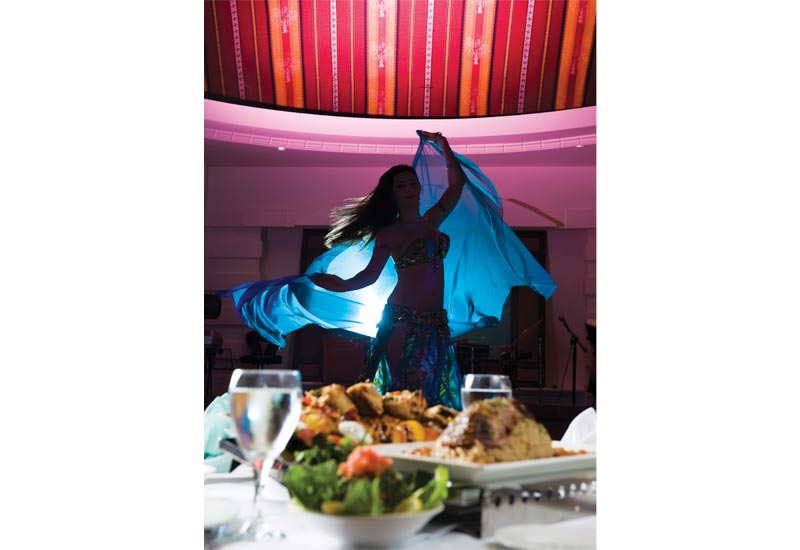 The Lebanese restaurants in the UAE often mix food with other MidEast traditions to create Arabic fusion concepts.
The Lebanese restaurants in the UAE often mix food with other MidEast traditions to create Arabic fusion concepts.
The rise in popularity of Lebanese cuisine is a response to the region’s growing multiculturalism. As a fusion cuisine, Lebanese F&B has a wider target market because it can appeal equally to the indigenous populations, expat communities and international visitors.
“There is a strong demand for Lebanese food here in the Middle East thanks to our food culture and the history of Lebanese cuisine,” explains Ibrahim Hadla, executive oriental chef at Al Khayal Restaurant, Jumeirah Beach Hotel. “The majority of food in the Middle East originated in Lebanon and this is why it’s so popular today.
“I think of Lebanese food as more of a Mediterranean cuisine, rather than an Arabic one,” explains executive chef Paul Hage, who has responsibility for the Al Basha Lebanese Restaurant at Habtoor Grand Resort & Spa in Dubai.

| Advertisement |
“It borrows from the palates of countries such as Greece, Cyprus, Italy, France and, most importantly, Turkey. In this sense it is a very popular cuisine that can appeal to an incredibly wide spectrum of tastes.”
The broad appeal and popularity of Lebanese food is perhaps most evident in the strong demand for the cuisine in events catering. At the Taj Palace Hotel Dubai, the Lebanese food served in its Topkapi Restaurant is the cuisine of choice for local events, as
general manager, Andreas Mueller confirms: “Demand in events catering is very strong for Lebanese food. If we sell a local event, around 90% of the food will be Lebanese or Lebanese influenced, and we often get requests for Lebanese-style appetisers, mezze, grills and main dishes.
“In fact, the entire restaurant scene here is very heavily influenced by Lebanese cuisine and it has definitely established a firm tradition for itself throughout the region. I think the attraction comes from the fact that Lebanese food is ‘real’. It is fresh. It is healthy.
“Typically, a meal will consist of fresh salads, raw vegetables, olives and pickles. The meat is simply grilled so the flavours are retained and it is enhanced by garlic, lemon and herbs. This can be compared in many ways to Mediterranean food and can be enjoyed by both Arabian and European diners. For this reason, I think we will only continue to see growth in outlets serving Lebanese cuisine.”
Healthy upward trend
A key driver in the growth of Lebanese outlets in the region is that fact that the cuisine can tap into the emerging healthy eating trend. Consumers are becoming increasingly more concerned about the origin, freshness, and the health benefits of cooking methods used in restaurants – and Lebanese food can deliver on each of these points.
“I really do see Lebanese cuisine growing in the future as a result of the healthy eating trend,” continued Mueller.
“Everyone already knows about the health benefits of Mediterranean cuisine. As a close relation, Lebanese outlets can utilise this for growth.”
The F&B operators that can successfully align their brands with the emerging health-driven consumer trends that we are seeing will be best positioned to grow their revenue and profitability in the coming few years – up to a maximum of 55% profitability, according to Hage.
“The health trend has certainly prompted the region’s chefs and restaurateurs to introduce exciting Lebanese items in their menus,” explains Frank Owens, group general manager of Emirates Grand Hotel in Dubai, which includes the Lebanese Fakhreldine Restaurant & Café.
“One of the more healthy aspects of Lebanese cuisine is the manner in which it is served: the mezze. This array of small dishes is placed before the guests creating a sweep of colour, flavour, texture and aroma.
Although impressive, the dishes are also easy to prepare and suitable for a healthy diet. Therefore, the combination of health and entertainment will be the key factor in Lebanese brands expanding in the Middle East – especially in the UAE.”
Article continues on next page...








 Search our database of more than 2,700 industry companies
Search our database of more than 2,700 industry companies









